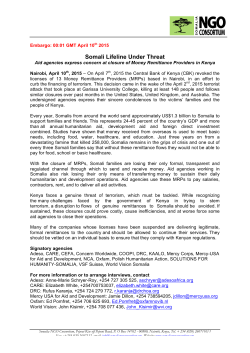
The University of Nairobi today, engaged stakeholders in the search
The University of Nairobi today, engaged stakeholders in the search for strategies that will counter terrorism in Africa. The forum which aimed at creating a platform for dialogue and discussion on terrorism issues brought together the government, academicians, diplomats, non-government organizations and students. During the symposium, dubbed ‘Countering Terrorism: In Search of a Grand African Strategy,’ the academia was challenged to engage in research on understanding terrorism and disseminating knowledge and strategies on how to counter terrorism. Giving the keynote address, Dr. Amb. Monica Juma, Secretary to the Cabinet, noted with concern that analysis suggests that there is a limited grasp of issues of terrorism. Dr. Juma said that there is a space for comparative research on how to deal with the terrorism phenomenon and called on universities to do so. In her presentation, Dr. Juma highlighted key areas of research that academia can look into. She said that the research community needs to look at the new identity of Kenya linking it to countering terrorism and research on how Kenya fits in the global context of terrorism. In addition, scholars need to investigate the factors that lead to radicalization of the youth, the reporting and messaging of terrorism among the media in Kenya as well as the connection between the refugee camps and the heightened insecurity in the country. Key issues picked from the speakers showed that terrorism has become a major security concern of this century. Terror groups continue to pose real threats to national and international security. Development initiatives in such sectors as transport, tourism, education, and agriculture have been adversely affected. Generally, the increasing insecurity in the region and the world has led to the diversion of resources from development programmes to countering terrorism. To this end, the Vice-Chancellor, Prof. Peter Mbithi said that the University of Nairobi is committed to take up the agenda of counter terrorism and conduct research on the same. Prof. Mbithi said that in line with the University’s mandate of training, teaching, and research, UoN will continue to contribute to national and international efforts to counter this security issue. Prof. Mbithi revealed that the University of Nairobi is ready to make its expertise, information data banks, and facilities available and at the disposal of government and other stakeholders in the efforts to counter terrorism. A significant proportion of the curriculum is geared towards capacity building and empowering graduates to play key roles in various development activities contributing to national and regional security.During the panelists’ discussions, various speakers touched on different issues of terrorism. The Cabinet Secretary, Ministry of State for Defense, Amb Raychelle Omamo, gave a moving presentation on the importance of instilling and interrogating family values. She said that for Kenya to counter terrorism, it is important to instill proper values in the young minds right from the grassroots which is the family unit. Attorney General Prof. Githu Muigai looked at the connection between human rights and dealing with terrorism. Other topics covered during the symposium include typologies of terrorism, the role of religion in counter terrorism, radicalization of the youth in terrorism in Africa, policy, legal and institutional frameworks of counterterrorism and regional mechanisms for counterterrorism in Africa. The symposium was organized by the Institute of Diplomacy and International Studies (IDIS) jointly with the Africa Policy Institute (API). It is the first of its kind to be hosted by an academic institution in Kenya.
© Copyright 2025

















